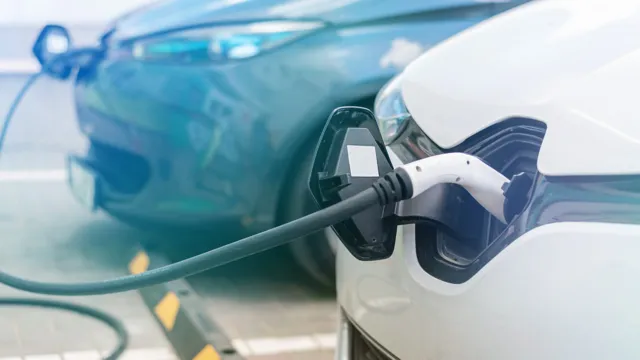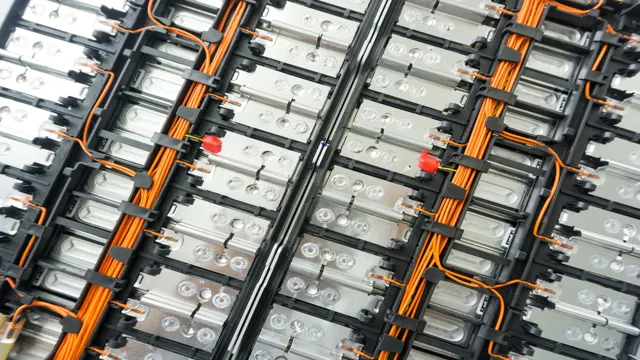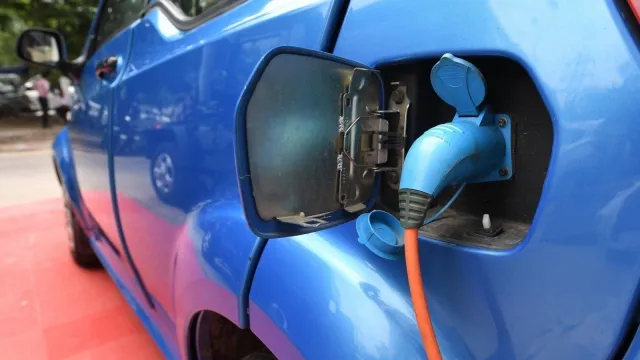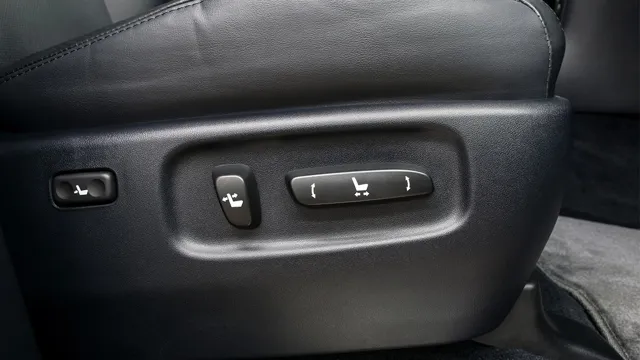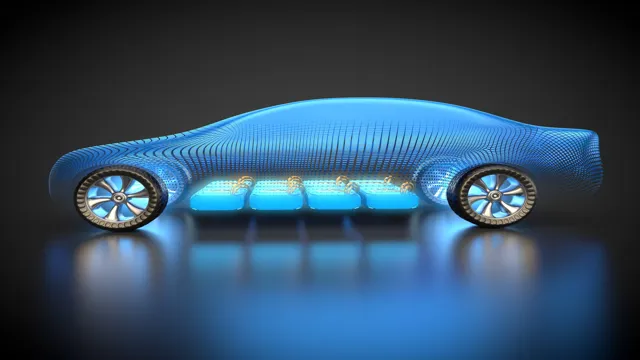The Shocking Truth: Unveiling the Dark Side of Electric Car Batteries
Electric cars have been gaining popularity over the years, and for good reason – they’re better for the environment and cheaper to run. However, like anything new, there are some downsides to consider. In this article, we’ll be looking at the cons of electric car batteries.
While electric cars may be eco-friendly, the batteries that power them have their own set of issues. For one, they’re not exactly cheap. Replacing an electric car battery can cost thousands of dollars, which is a major deterrent for many people.
Another issue is the limited range that electric cars have. While newer models are improving on this, the fact remains that you can’t drive an electric car as far as you can a gas-powered one without needing a recharge. Plus, finding a charging station can be difficult in some areas, which can be a real inconvenience.
There’s also the issue of battery lifespan. Like all batteries, those in electric cars degrade over time. This means that you may need to replace your battery sooner than you would with a gas-powered car.
And, when your battery does die, it’s not as easy as just filling up your tank – it could take hours to recharge. Overall, electric car batteries certainly have their downsides, but they also have a lot of positives. As with any major purchase, it’s important to weigh the pros and cons before making a decision.
Limited Driving Range
One of the main cons of electric car batteries is their limited driving range. Unlike gasoline cars that can travel hundreds of miles on a tank of gas, most electric cars have a much shorter range between charges. This can be a major concern for drivers who frequently travel long distances or rely heavily on their car for daily use.
While some newer models have improved ranges, the high cost of these cars can be a barrier for many consumers. Additionally, the need to stop and recharge the battery can be inconvenient if there aren’t enough charging stations available. This issue is slowly being addressed with the expansion of charging infrastructure, but it’s important for drivers to consider their driving habits and needs before deciding if an electric car is right for them.
Battery Degradation Over Time
As electric cars become more popular, battery degradation over time has become a concern for prospective buyers. One of the main consequences of battery degradation is limited driving range, which can be frustrating for commuters and those on long road trips. Essentially, battery degradation means that over time, the battery in an electric car will hold less of a charge and therefore won’t be able to take you as far.
This can be caused by a variety of factors including temperature, the number of charging cycles, and the age of the battery. However, it’s important to remember that battery degradation doesn’t happen overnight and most electric cars come with warranties that cover a certain level of battery degradation. Additionally, keeping your car’s battery charged between 20% and 80% can extend the life of your battery and slow down the effects of degradation.
While battery degradation over time is a valid concern for electric car owners, it’s important to take proactive measures to mitigate the effects and enjoy the many benefits of driving an electric car.
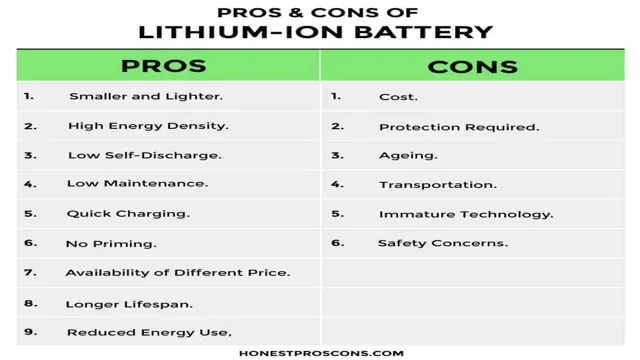
Long Charging Times
Electric vehicles have become increasingly popular due to their eco-friendliness and low operational costs. However, one of the biggest concerns for electric vehicle owners is the limited driving range and long charging times. While electric vehicles have come a long way in terms of their driving range, they still fall short when compared to traditional gas-powered vehicles.
This means that electric vehicle owners need to plan their trips carefully and ensure that they have access to charging stations along the way. Furthermore, charging an electric vehicle can take several hours, which is not practical for those who are on the go. Despite these challenges, electric vehicles are still a great option for those who are looking to reduce their carbon footprint and save money on gas.
With advancements in technology, we can expect to see improvements in driving range and charging times in the coming years, making electric vehicles an even more attractive option for drivers.
Higher Upfront Cost
One of the major cons of electric car batteries is their higher upfront cost. While electric cars are becoming more affordable, their initial price tag can still be a barrier for some potential buyers. The cost of batteries is a significant portion of the overall price of an electric car, and as battery technology continues to improve, they may become even more expensive.
However, it’s important to note that while electric cars have a higher upfront cost, they often have lower operating costs in the long run. This is due to their increased efficiency and lower maintenance requirements, meaning they can save drivers money on fuel and repairs over time. Additionally, many governments offer incentives such as tax credits and rebates to help offset the initial cost of purchasing an electric car.
Expensive Battery Replacement
As electric vehicles gain popularity, one of the biggest concerns for potential buyers is the cost of battery replacement. While it’s true that the cost of replacing an EV battery can be expensive, it’s important to remember that the upfront cost of an EV is typically higher than that of a traditional gas-powered car. This higher upfront cost is due in part to the cost of the battery, which is one of the most expensive components of an EV.
However, it’s important to remember that the overall cost of ownership for an EV is generally lower than that of a gas-powered car due to savings on fuel and maintenance costs. Additionally, many manufacturers offer warranties on their batteries, which can provide peace of mind for EV owners concerned about the cost of replacement. Ultimately, while the cost of battery replacement is certainly something to consider when purchasing an EV, it should not be the only factor in your decision-making process.
Limited Options for Charging
When it comes to electric vehicles, one of the biggest challenges that users face is the limited options for charging. While more and more charging stations are being installed across cities and along highways, it can still be difficult to find a nearby station when you need it. This can be especially problematic if you live in a neighborhood or apartment complex that doesn’t have charging infrastructure.
Even when you do find a charging station, there can be long lines or the station may be out of service. With these challenges, it’s important for electric vehicle owners to plan ahead and be strategic with their charging. Another drawback of electric vehicles is the higher upfront cost compared to traditional gas-powered vehicles.
While the cost of electric vehicles has come down in recent years, they can still be more expensive than their gas counterparts. However, it’s important to look at the long-term savings when it comes to fuel and maintenance costs. Electric vehicles typically require less maintenance and can save drivers a significant amount on fuel costs over time.
Plus, there may be tax incentives or rebates available to help offset the cost of the vehicle. Overall, while the higher upfront cost may be a barrier for some, the long-term savings can make it a worthwhile investment.
Reduced Efficiency in Cold Weather
When it comes to deciding whether to switch to a heat pump system for your home, one important factor to consider is the upfront cost. Heat pumps are generally more expensive to install than traditional heating and cooling systems. However, the savings on your energy bills over time can offset this cost.
Another factor to consider is reduced efficiency in cold weather. Heat pumps work by transferring heat from the outside air or ground into your home, so when temperatures drop too low, the system may struggle to keep up. It’s important to consider your climate and energy needs when making the decision to switch to a heat pump.
Investing in a high-quality heat pump from a reputable manufacturer can improve the overall efficiency and reliability of your system. Ultimately, it’s important to weigh the upfront cost against long-term savings and potential energy efficiency benefits when making the decision to switch to a heat pump system.
Weight and Space Constraints
One of the main cons of electric car batteries is their weight and space constraints. Electric car batteries are typically bulkier and heavier than traditional gas-powered engines, which can result in reduced driving range and speed. In addition, electric car batteries require a lot of space, which can limit the amount of storage and passenger space available in the vehicle.
While advancements are being made in battery technology to reduce weight and size, this is still a major challenge facing the electric car industry. However, it’s important to note that the benefits of electric cars, such as reduced emissions and lower fuel costs, often outweigh the drawbacks of battery constraints.
Limited Cargo Space
When it comes to shipping goods, one of the biggest constraints is limited cargo space. It’s not just about weight but also volume. Shipping carriers have weight and space limits they abide by which means you need to ensure that the weight and size of your shipment are within those limits.
It is essential to understand how weight and space work together so that you can maximize the available space while ensuring you don’t exceed the weight limit. But how do you manage that? The answer lies in efficient packaging and using the right materials. You can use strong packaging materials such as bubble wrap or foam sheets that take up minimum space while providing adequate protection to your goods.
Another tip is to use small boxes or containers that stack easily and reduce empty spaces between packages. It’s also crucial to use accurate measurements and weights when calculating cargo space, and you must be mindful of any hazardous materials that are not allowed in cargo. In short, to make the most of your limited cargo space, you need to prioritize the efficient use of space and weight management.
Heavier than Gasoline Cars
When it comes to electric cars, one of the criticisms is that they are heavier than traditional gasoline cars. This is due to the weight of the batteries needed to power the vehicle. In addition to the weight of the batteries, there are space constraints that contribute to the overall weight of an electric car.
The batteries need to be arranged in a way that maximizes their efficiency, which can lead to the placement of batteries in areas that may add unnecessary weight to the car. However, it’s important to note that the weight difference between an electric car and a gasoline car is not significant enough to impact the car’s performance or safety. In fact, the weight distribution of an electric car can sometimes enhance its performance, offering better handling and stability on the road.
So, while electric cars may be heavier than traditional cars on the market, this doesn’t necessarily mean that they are inferior in any way.
Environmental Concerns
Electric cars are becoming increasingly popular due to their positive impact on the environment and the savings they provide on fuel costs. However, one of the biggest concerns about electric cars is the production and disposal of their batteries. Electric car batteries contain materials such as lithium and cobalt, which are mined in environmentally damaging ways.
Additionally, the disposal of these batteries can also cause harm to the environment due to their toxic components. Despite efforts to improve the recyclability and sustainability of electric car batteries, it still remains a major challenge for the industry. While electric cars have many benefits, the cons of their batteries should also be taken into consideration when making a purchasing decision.
It is important for manufacturers to continue finding ways to address the environmental concerns surrounding the production and disposal of electric car batteries in order to make them a truly sustainable transportation option.
Conclusion
While electric car batteries have their advantages, they also have some notable cons. The most obvious of these is that they eventually need to be replaced and often come with a hefty price tag. Additionally, the production of the batteries can be environmentally damaging, and their disposal can also present significant challenges.
So, while electric cars may be great for reducing emissions, it’s important to consider the full lifecycle impact of their batteries before rushing to embrace them as a complete solution. In other words, it’s electric car batteries may be a step in the right direction, but they won’t charge us towards a perfect and problem-free world.”
FAQs
What are the disadvantages of electric car batteries compared to traditional gasoline-powered vehicles?
The main cons of electric car batteries are their limited range, long charging times, and high cost.
Can electric car batteries be recycled?
Yes, electric car batteries can be recycled, but the process is expensive and still in its early stages.
How long do electric car batteries last?
The lifespan of electric car batteries varies, but typically ranges from 8 to 10 years or 100,000 to 200,000 miles.
Do cold temperatures affect the performance of electric car batteries?
Yes, cold temperatures can reduce the range and efficiency of electric car batteries, so they may not be the best choice for colder climates.
